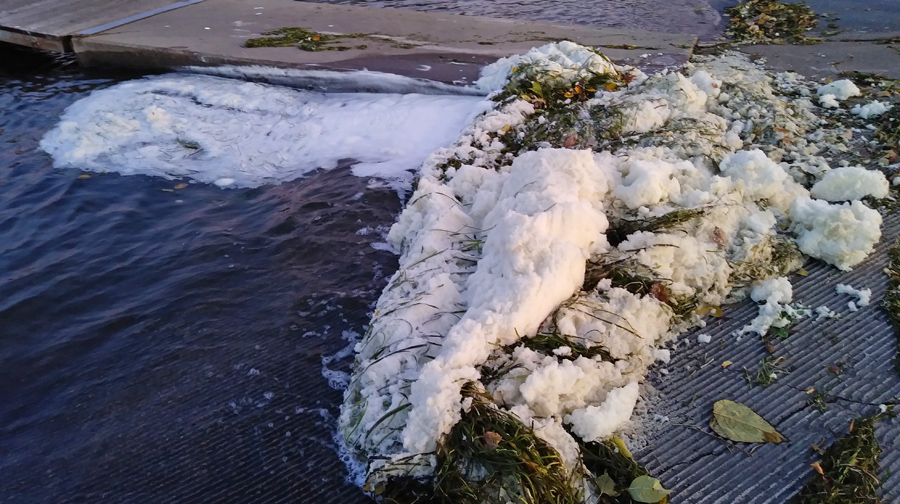Judge Rules DNR Can’t Regulate PFAS
State agency lacks authority, Waukesha judge rules. Environmental advocates plan appeal.

Foam in Starkweather Creek shows elevated levels of PFAS chemicals. Photo from October 2019 courtesy of the DNR.
The authority of the Wisconsin Department of Natural Resources (DNR) to regulate PFAS (per and fluroalkyl substances) “forever chemicals” that have contaminated drinking water was blocked on Tuesday. Waukesha County Circuit Court Judge Michael Bohren ruled that the DNR cannot regulate PFAS and other emerging toxic compounds under Wisconsin’s Spills Law. If allowed to stand, the ruling defangs the state’s protection against PFAS contamination, an emerging toxic threat to many communities.
PFAS are part of a group of man-made chemicals which were used in a variety of products for decades from firefighting foam to non-stick coatings for wrappers and pans. The bio-resistant compounds don’t break down in the environment, and have been linked to chronic diseases including cancers, thyroid disorders, and birth defects. Tuesday’s ruling came out of a lawsuit filed by Wisconsin Manufacturers and Commerce (WMC) in February in defense of an Oconomowoc-based dry cleaning company. WMC argued that the company should not be required to clean up chemicals that had not previously been specifically identified by the DNR as requiring environmental remediation.
“My community has been devastated by PFAS contamination stemming from Tyco Fire Products’ testing operations,” said Doug Oitzinger, a former mayor of Marinette. “Exposure to these toxic chemicals has been linked to cancer and other serious health problems.” Oitzinger stressed that, “if this decision stands, it will have devastating real-world consequences for people living in Marinette, Peshtigo, La Crosse, and other communities harmed by PFAS contamination. All of the assistance that the DNR is currently providing to these communities would vanish — the required well testing, the orders for cleanup and remediation — it would all come to a halt.”
Around the state, sites contaminated by PFAS and other forever chemicals are continuing to be identified, including areas of land, waterways and private wells. In early March, a PFAS advisory was issued for one of Wisconsin’s few high-quality trout streams. Later that same month, the state Department of Justice filed a lawsuit against Tyco Fire Products and Johnson Controls over PFAS contamination in Marinette. October of last year saw half of Eau Claire’s water well shut down due to PFAS levels.
“While today’s circuit court ruling is disappointing, we expect it to be appealed and are confident that the DNR’s efforts to keep Wisconsin families safe from PFAS contamination will ultimately be vindicated,” said Rob Lee, staff attorney with MEA.
The argument that the DNR lacks the authority to regulate and enforce PFAS policies raises the question of where that authority lies. “That is a great question,” Peg Shaeffer, director of communications and development for MEA, told Wisconsin Examiner. “These are very toxic substances,” Sheaffer added. “Wisconsinites have a right to drink water that’s free of hazardous substances.”
Sheaffer noted an argument made by WMC that if the DNR wanted to regulate PFAS as “emerging contaminants” the regulation would need to go through the Legislature’s rule-making process. “So the judge in this case isn’t saying that the DNR has no authority to regulate PFAS period. What he’s saying is if DNR intends to regulate them as emerging contaminants, then the DNR has to go through this very lengthy rule-making process that is subject to all sorts of political interference.”
In February, the Natural Resources Board voted 6-1 to impose limits for PFAS, PFOA, and PFOS chemicals in drinking water at 70 parts per trillion. That was a far cry from the 20 parts per trillion limit recommended by the Department of Health Services. Some members of the board rejected scientific consensus.
Allison Werner, executive director of River Alliance of Wisconsin, also expressed dismay after the Waukesha Circuit Court Court ruling. “WMC’s assault on the state’s ability to address PFAS contamination is a significant threat to Wisconsin’s water resources, to public health, and to all the sectors of our economy — including tourism and agriculture — that rely on clean water,” said Werner.
President and executive director of Clean Water Action Council of Northeast Wisconsin Dean Hoegger echoed the sentiment. “When it comes to regulating PFAS and other emerging chemicals, we need to move forward, not backward, said Hoegger. “The idea of returning to a time when polluters weren’t held accountable for cleaning up contaminated soil and water —it’s unthinkable. Unfortunately, that’s exactly what’s at stake if this decision stands.”
Sheaffer said that while an appeal of the decision is fully expected, environmental groups are also waiting to see how the DNR will react. “We are prepared to continue our participation in the case in order to defend the Spills Law.” She said. “If this particular decision stands, I think it’s important to know that it would have really important and devastating consequences for people right now in Wisconsin whose water is contaminated by PFAS. So, this is not sort of a theoretical exercise about government authority. This is real-world stuff, and it will have tremendous consequences.”
Judge rules DNR lacks authority to regulate PFAS was originally published by the Wisconsin Examiner.
More about the PFAS Problem
- PFAS Levels in Great Lakes Fish Are Dropping - Danielle Kaeding - Feb 6th, 2026
- Gov. Evers and GOP Lawmakers Near a Deal on PFAS Pollution - Danielle Kaeding - Jan 22nd, 2026
- Gov. Evers Optimistic About Reaching Final Deal With Republican Lawmakers to Secure Release of $125 Million in Long-Awaited Pfas Investments - Gov. Tony Evers - Jan 21st, 2026
- Bipartisan Push to Tell Counties Faster When Water Tests Fail - Henry Redman - Dec 19th, 2025
- MKE County: County Seeks to Sue PFAS Producers, Oil Companies - Graham Kilmer - Dec 10th, 2025
- Wisconsin Reviewing EPA-Approved Pesticides For PFAS - Danielle Kaeding - Dec 9th, 2025
- State Nears Settlement with Johnson Controls/Tyco Over PFAS Spills - Danielle Kaeding - Dec 4th, 2025
- Senate Bill Promotes Soybean-Based Firefighting Foam to Replace PFAS - Danielle Kaeding - Dec 2nd, 2025
- Test Results Show High PFAS Levels in Wisconsin’s Landfill Runoff - Danielle Kaeding - Dec 2nd, 2025
- Wisconsin Communities Get $282 Million for Drinking Water Projects - Danielle Kaeding - Nov 19th, 2025
Read more about PFAS Problem here






















Don’t worry folks, the corporations that make the PFAS are giving campaign cash to Republicans in car loads.
They’ll be protected i know you’re all.worried that the corporations would have to take responsibility.